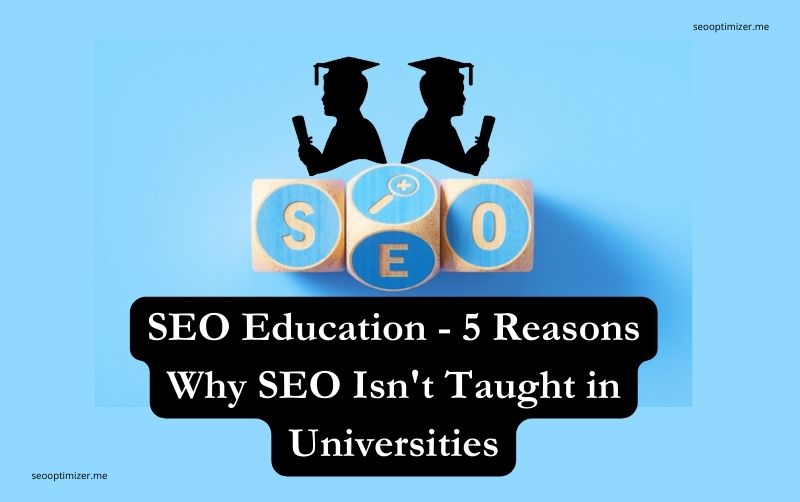SEO Education - 5 Reasons Why SEO Isn't Taught in Universities

Is SEO education and training offered at the university? Many SEO experts have argued for and against why SEO education is not offered at the university. So, in this article, I covered 5 major reasons why SEO isn't commonly taught in universities.
SEO Education - 5 Reasons Why SEO Isn't Taught in University
1. SEO Changes and Advancement:
One of the major reasons why SEO isn't extensively covered in university curricula is the changing situation of SEO. Search engines like Google continually update their algorithms, which hence render some SEO practices obsolete while introducing new ones. Universities often struggle to keep up with this dynamic nature of SEO, as the traditional curriculum development process is time-consuming and may not align with the fast-paced changes in the digital realm.
So it is important to understand that SEO is not a static concept but a dynamic field. This fast-paced nature makes it challenging for educational institutions to design and implement courses that remain relevant over an extended period. As a result, many universities prefer to focus on more stable and established subjects that undergo fewer fluctuations.
2. Lack of Standardization in SEO Practices:
Unlike some academic disciplines with well-established theories and universally accepted practices, SEO lacks standardization. The field is filled with diverse opinions, seo strategies, and tactics, making it challenging to create a universally recognized curriculum. SEO experts often differ in their approaches, and what works well in one scenario may not be as effective in another.
This lack of standardization poses a challenge for educators aiming to create a cohesive and structured SEO curriculum. Universities typically strive to provide students with a standardized education that equips them with universally applicable knowledge and skills. The absence of a unified approach to SEO makes it difficult for educational institutions to develop a curriculum that can withstand the test of time and technological advancements.
Also read: Difference Between Short and Long tailed keywords in SEO
Also read: How to Optimize Website Speed For SEO
Related: Backlinks for SEO - 8 Effective ways to Acquire High-Quality Backlinks
3. Practical Nature of SEO:
SEO is a highly practical discipline that involves hands-on experience and real-world application. Unlike theoretical subjects that can be taught in a classroom setting, mastering SEO requires practical implementation, experimentation, and continuous adaptation to changing algorithms and user behaviors. This practical nature of SEO makes it challenging for universities to integrate it seamlessly into their traditional teaching methods.
While theoretical knowledge is essential, the dynamic nature of SEO demands a strong emphasis on practical skills. Students benefit more from learning through practical experiences, such as working on real projects, conducting SEO audits, and optimizing actual websites. Unfortunately, the traditional structure of university education which provides academic skills, may not align well with the hands-on requirements of SEO.
4. Misconceptions About SEO as a Discipline:
Another factor contributing to the absence of SEO education in universities is the prevalence of misconceptions about the nature and legitimacy of SEO as a discipline. Some individuals still perceive SEO as a mysterious and unethical practice aimed at manipulating search engine rankings. These misconceptions may lead educators to question the ethical implications of incorporating SEO into their curricula.
To overcome these misconceptions, there is a need for a broader understanding of SEO as a legitimate and essential aspect of digital marketing. SEO, when done ethically, is about optimizing content and websites to provide valuable information to users, aligning with search engine algorithms to enhance visibility. Dispelling these myths and highlighting the ethical considerations within SEO could pave the way for its inclusion in university education.
Also read: 14 Top SEO Experts in the SEO Industry
Also read: 145 SEO Abbreviations, Acronyms, and Meanings
Read also: The Importance of Local SEO for Small Businesses
Related: The Future of Voice Search and its Implications For SEO
5. Resource Constraints and Limited Expertise:
The inclusion of a new subject in a university curriculum requires substantial resources and expertise. Given the resource constraints faced by many educational institutions, especially smaller ones, dedicating resources to develop and maintain an SEO curriculum may not be a priority. Additionally, the demand for qualified SEO educators is relatively high, and universities may struggle to find instructors with the requisite expertise to teach SEO effectively.
SEO is a multifaceted discipline with various aspects, including technical SEO, content optimization, link building, and analytics. Finding educators with expertise in all these areas can be challenging, as the field requires a combination of technical knowledge, analytical skills, and creative thinking. Without a pool of qualified instructors, universities may hesitate to introduce SEO courses that lack the necessary depth and breadth.
Also read: 8 Essential Web & SEO Tools for Auditing and Monitoring Websites
Also read: 7 Steps To Grow your Domain Authority
Read also: Best Guide for Keywords Usage in SEO
Related: 11 Common SEO Mistakes you Should Avoid
Related: Ultimate SEO Guides for Ranking in 2023
What's Next –
Start SEO Optimization. Analyze your website with Free SEO Optimizer
Audit your website for Free - SEO audit free



